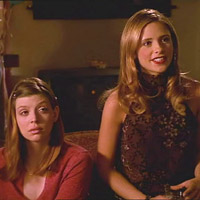













Interview with Amber Benson
Dec 7, 2003, Offenbach
1. Magic, Multitasking and Motivation
2. Movies, television and the family
4. "Chance", Sex and Power
5. The Technicalities of Being Inspired
6. Reading, Collaborating, Watching & Listening
Professionalism and/or/versus Inspiration. From what I hear about Sarah Michelle Gellar, she’s about as professional as you can get – very Jodie Foster. Is that a role model for you, what do you think about professionalism?
Look at Sarah, she’s very analytical, and she admits it. She walks into a set and she knows where her light is, she knows her lines, she has them down cold. She knows where everything is in relation to her, she knows how to get it done so you don’t have to do ten takes. You do two takes and that’s it. Some actors, they don’t know their lines, they don’t know what they’re doing, they’re searching for their marks and it takes forever. Sarah always is on top of things and I’m so respectful of that. That’s how I try to be in a working environment, because you have too many people depending, relying on what you’re doing to goof off. Sarah’s professionalism can be very intimidating to some people. But if they looked at it realistically and would think about why people are that way – because they’re trying to do their job, so they’re not there for twenty hours, which sometimes you could be at "Buffy". We could be there all day.
Non-actors probably can’t imagine what several takes can do to your motiviation. When it’s emotionally wrenching, you don’t whant to be on the verge of tears for hours.
Sarah’s amazing, I’m in awe of her. She comes, does good work and then she goes home. I think that’s wonderful, I respect that so much. For me, I’m an amalgamation, I have a little bit of both: I always know my lines, but sometimes I also get lost in the creative side. If you get sucked into the moment, you don’t think analytically. But that can be when people start the journey with you.
When you don’t think of the audience that might be the moment when you’re giving them the most. So what’s artistic control to you – how do you achieve it, how much do you value it?
Well, being an actor you have absolutely no control. The only control you have is over your performance. And even then you don’t, because an editor comes in and can totally change everything you’ve done. As a writer, you have more control because you’re creating the product that everybody else is using, but then again someone can come in and change that: editors, directors, producers. If you are, say, someone who’s producing and writing and directing and also acting in what you’ re doing, the buck stops there. Actually, the buck stops at my mother. She was making sure that I was not going too over budget. We did extensive post production. Everybody was helpful, we edited, we debated, but it always was my vision. We tried to make it what I had seen in my head. That takes time. Obviously, you need post-sound and post-effects, music and everything, it’s very expensive. It was cheaper getting it into the can. The post added so much. We did DAT-tapes. So you have to go and cut and edit the sound. We ended up using a lot of “Buffy”s hardware. David Solomon, who’s one of the producers for the show, gave us access to that. He’s fantastic.
> back to top
> Part 4


